The 10 best Tesla alternatives 2025: Our favourite rivals to Elon Musk’s EVs
Gone off Tesla lately? Try these 10 top alternative electric cars instead
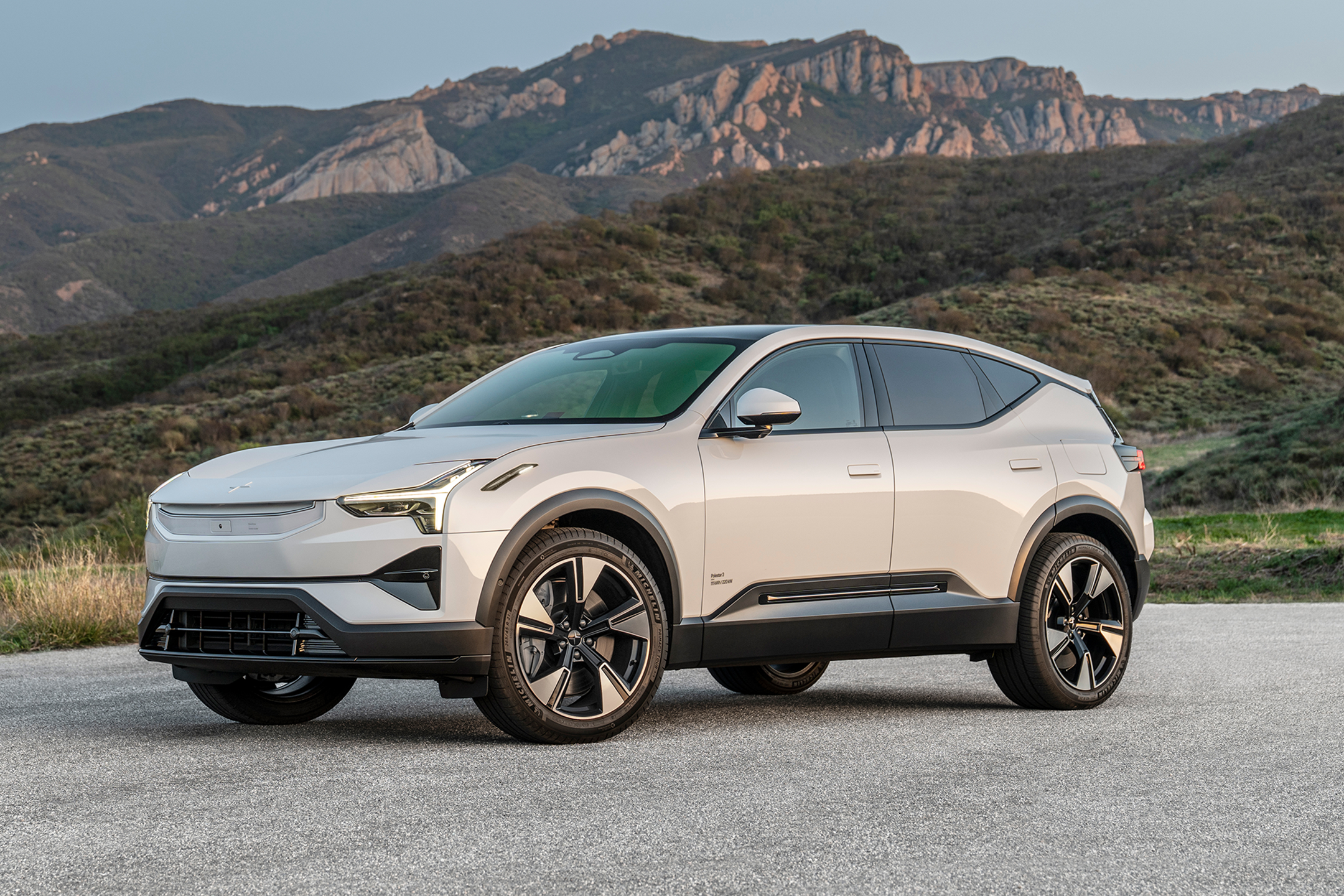
The days of Tesla being the default choice for an electric car are over. Not entirely because of Elon Musk, and certainly not because the Tesla Model 3 and Model Y have lost their edge, but because the EV market has dramatically matured and rivals have caught up. A new generation of compelling alternatives from established giants like Porsche and Volkswagen, alongside innovative challengers such as Polestar and BYD, now offer genuine competition.
Some Tesla rivals deliver more luxurious interiors, others more practical designs, and many now beat Tesla on price. For those switching cars, the wider range of options means you’ve more choice than ever when it comes to buying an EV that works for you. From family SUVs to high-performance saloons, here are ten of the best alternatives to the Tesla range.
The best Tesla Model 3 alternatives 2025
- BYD Seal: From £45,705, Byd.com
- Volkswagen ID.7: From £51,580, Volkswagen.co.uk
- Hyundai Ioniq 5 N: From £39,900, Hyundai.com
- Renault Scenic E-Tech: From £37,495, Renault.co.uk
- BMW i5: From £67,695, BMW.co.uk
- Porsche Taycan: From £86,500, Porsche.com
- Kia EV9: From £65,025, Kia.com
- Polestar 3: From £69,900, Polestar.com
- Hyundai Ioniq 5 N: From £65,000, Hyundai.com
- MG Cyberster: From £54,995, Mgcyberster.co.uk
1. BYD Seal: From £45,705, Byd.com
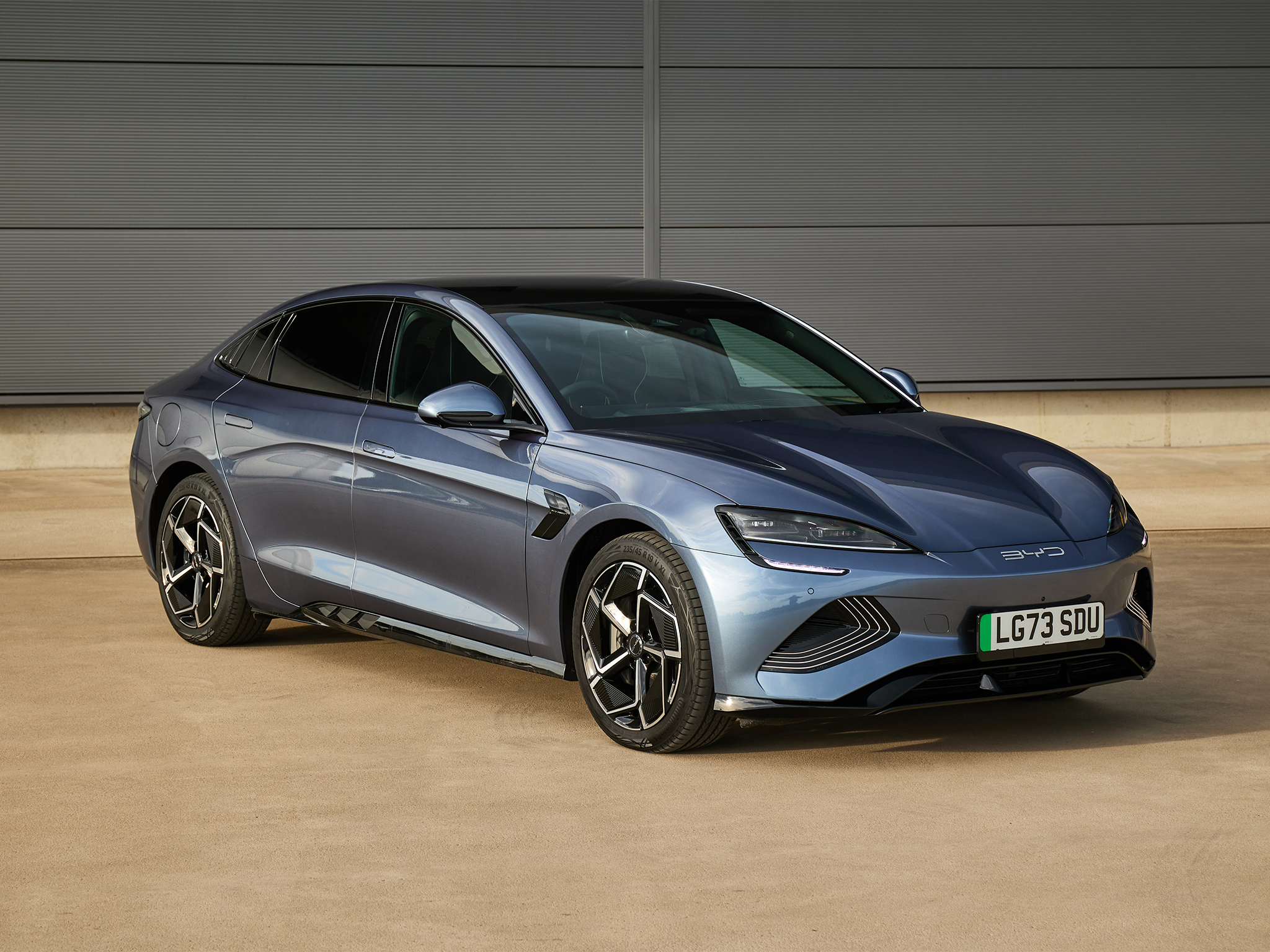
- Pros: Up-market styling, good range and efficiency, fully-loaded as standard
- Cons: Pricier than some rivals, infotainment can be fiddly, quicker model isn’t worth it
BYD Seal specs
- Price range: £45,705 to £48,695
- Battery size: 82.5 kWh
- Maximum claimed range: 354 miles
- Miles per kWh: 4.5
- Maximum charging rate: 150 kW
Based in China and a so-called backronym for Build Your Dreams, BYD regularly duels with Tesla for the title of world’s biggest electric car company. BYD produces millions of cars every year, and although the majority of its sales are in China, the company has recently expanded into Europe and the UK.
The BYD Seal is a five-seat, five-door electric saloon car with a maximum claimed range of 354 miles. That’s a fair bit more than the entry-level Tesla Model 3 (318 miles) and the quickest Model 3 Performance (328 miles), but falls short of the suitably named Model 3 Long Range, which can cover over 430 miles between charges. With prices ranging from £45,495 to £48,695, the BYD Seal falls within the Tesla Model 3 family, which extends from £39,990 to £59,990.
We gave the BYD Seal and score of 7/10 and praised its up-market styling, good range and efficiency, and how it comes loaded with kit as standard – including heated, ventilated and electrically-adjusted seats, Apple CarPlay, a 12-speaker stereo and wireless phone charging. Our expert said: “Although new to the UK, BYD is China’s biggest EV maker. The Seal is its plushest car yet for our market, with good range and performance at a decent price, but its tech is frustrating.”
2. Volkswagen ID.7: From £51,580, Volkswagen.co.uk

- Pros: Long range, smooth ride, loads of space
- Cons: Dull looks, infotainment not great
Volkswagen ID.7 specs
- Price range: £51,580 to £61,980
- Battery size: 77kWh to 86kWh
- Maximum claimed range: 436 miles
- Miles per kWh: 4.54
- Maximum charging rate: 175kW
In our opinion, the ID.7 is the best electric car currently made by Volkswagen. It beats the Tesla Model 3 on space and comfort, while at 436 miles it matches the America exactly on maximum range.
Priced from £51,550 to £61,980, the ID.7 is more expensive than the Model 3. But it’s larger too, and since the Tesla Model S is currently unavailable in the UK, we reckon the Volkswagen is a great alternative for anyone considering a second-hand Model S. It also benefits from relatively quick charging, at up to 175 kW, and a great energy efficiency rating of 4.54 miles per kWh.
Read our full Volkswagen ID.7 review
We gave the VW ID.7 a score of 8/10 when we reviewed it, and praised its long range, smooth ride and masses of interior space – especially in the back, where we reckon the rear seats serve up Mercedes levels of comfort. Our expert said: “I reckon the ID. 7 is the best electric car Volkswagen makes. It may not quite measure up to the Tesla Model 3 – mostly because of the price – but it feels in many ways like a mini-Mercedes because it’s so comfortable.”
The best Tesla Model Y alternatives
3. Hyundai Ioniq 5: From £39,900, Hyundai.com

- Pros: Efficiency, space, comfort, good to drive
- Cons: Expensive, bigger than you think
Hyundai Ioniq 5 specs
- Price range: £39,900 to £52,400
- Battery size: 63 & 84kWh
- Range: 354 miles
- Miles per kWh: 3.9
- Maximum charge rate: 260 kW
Recently refreshed for the 2025 model year, we think the Hyundai Ioniq 5 – a former World Car of The Year, no less – is a fine alternative to the Tesla Model Y. The entry-level Ioniq 5 is £90 cheaper than the base Model 3, at £39,900, while the most expensive version (apart from the racy Ioniq 5 N) is £52,400. There are two battery sizes on offer and the maximum range is a claimed 354 miles. The Hyundai’s maximum charge rate of 260 kW puts it among the best of any electric car on sale today, and means it can fill its battery from 10 to 80 per cent in as little as 18 minutes.
Read our full Hyundai Ioniq 5 review
We gave the Ioniq 5 a score of 9/10 in our review, and praised its energy efficiency, space and comfort, as well as how good it is to drive. Our expert said: “In a world without Tesla, the Hyundai Ioniq 5 could well vie for the title of best all-round EV – it really is that good.”
4. Renault Scenic E-Tech: From £37,495, Renault.co.uk
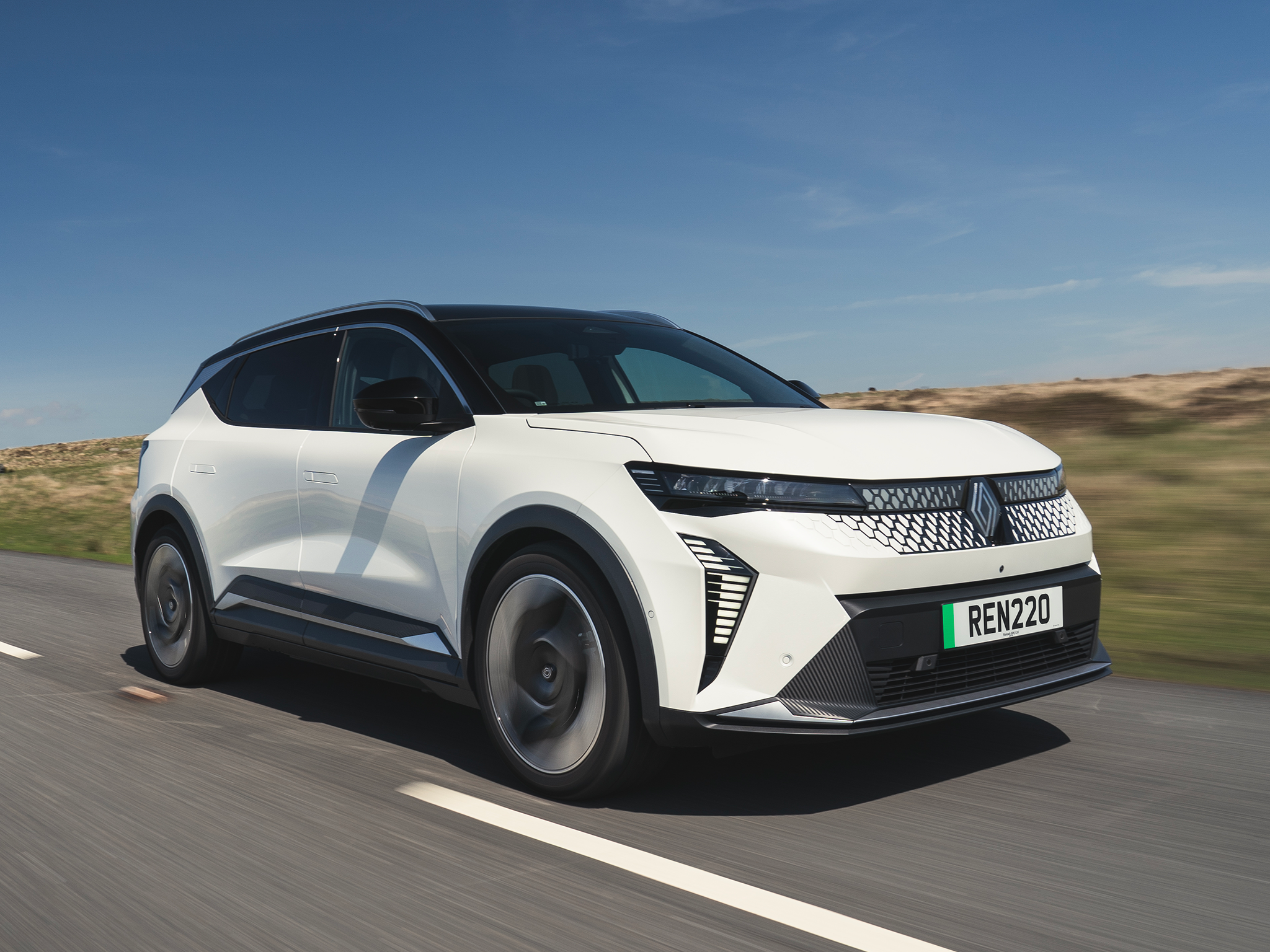
- Pros: Long range, family-friendly interior, strong tech
- Cons: Expensive, lumpy ride, interior quality
Renault Scenic E-Tech specs
- Price range: £37,495 - £45,495
- Battery size: 60kWh & 87 kWh
- Maximum claimed range: 379 miles
- Miles per kWh: 3.8
- Maximum charging rate: 150kW
A winner of European Car of The Year, the reinvented Renault Scenic is a family-friendly EV with a maximum range of 379 miles, a clever Google-powered infotainment and navigation system, and kid-friendly features like armrests with integrated holders and power supplies for phones and tablets.
Priced from £37,495 to £45,495, we reckon the electric Renault family-mover is a great alternative to the Tesla Model Y, which starts at £46,990 and runs right up to £59,990. As for a range comparison, the Renault’s 379-mile maximum is ahead of all three variants of the Model Y.
Read our full Renault Scenic E-Tech review
We gave the Scenic E-Tech a score of 8/10 and praised the Renault EV for its long range, strong tech offering and family-friendly interior. Our expert said: “The reinvention of the Scenic plays a big part in what Renault calls its Renaulution and, for the most part, it’s a huge success…the Scenic does a good job of proving family travel can be done brilliantly and easily in an electric car.”
The best Tesla Model S alternatives
5. BMW i5: From £67,695, BMW.co.uk
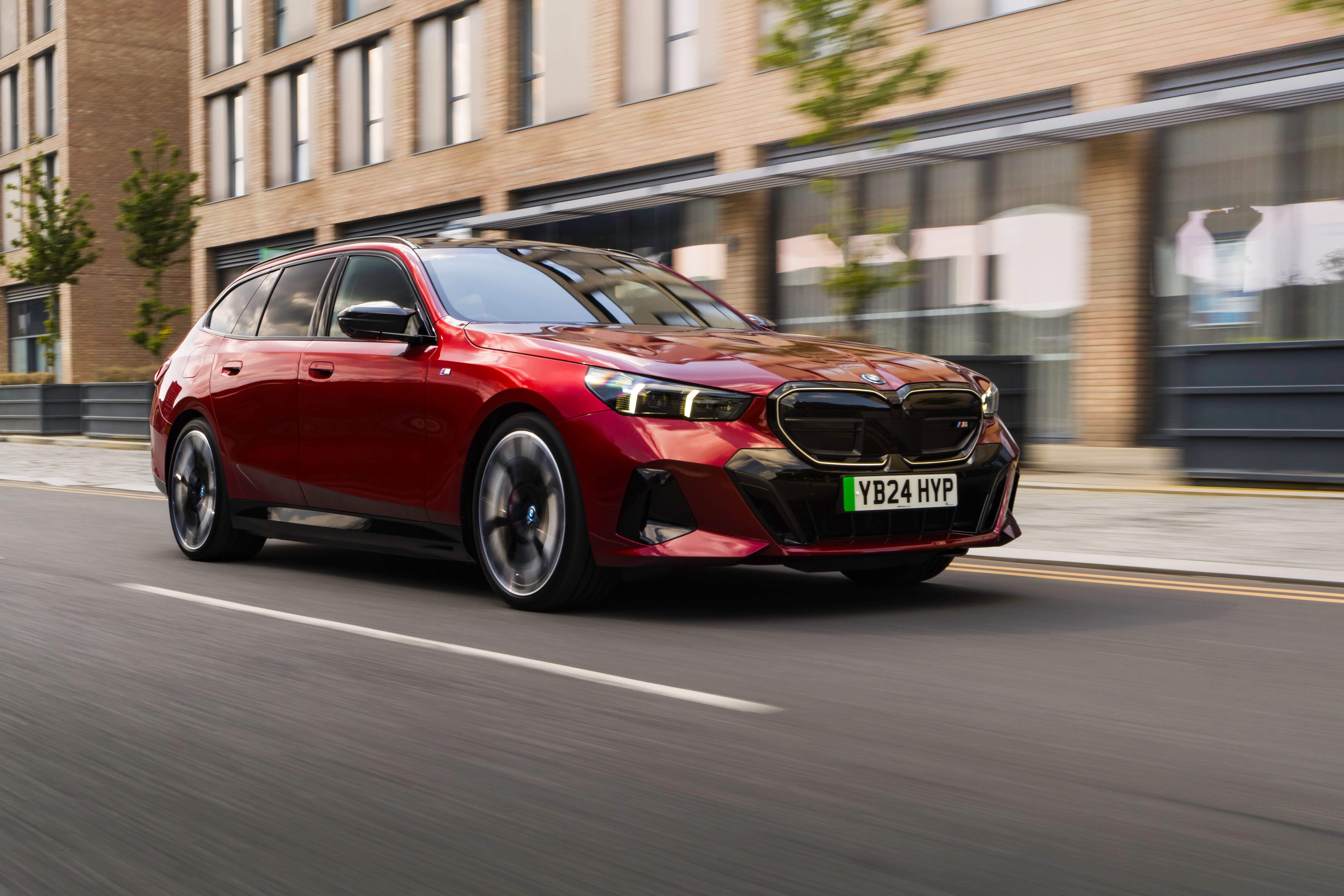
- Pros: Performance and refinement, comfort, slick in-car tech
- Cons: Range is average, expensive for a 5 Series
BMW i5 specs
- Price range: £67,695 to £97,745
- Battery size: 81.2kWh
- Maximum claimed range: 315 to 354 miles
- Miles per kWh: 3.4 to 3.8
- Maximum charging rate: 205kW
Tesla currently doesn’t offer its Model S saloon for sale in the UK. But since the car has been in production for a decade now, there are lots available on the secondhand market. These can represent fantastic value for money, but if you’d rather pick up a shiny new set of electric wheels, and fancy a Tesla Model S alternative, we recommend the BMW i5.
Priced from £67,695 to £97,745, the i5 is essentially what happens when BMW turns its famous 5-Series electric. The car has an 81.2 kWh battery pack and a maximum claimed range of between 315 and 354 miles. There’s also speedy charging, thanks to a maximum rate of 205 kW, and massive performance if you go for the 600-horsepower M60 xDrive variant.
We gave the BMW i5 a review score of 8/10 and praised its performance and refinement, as well as its comfort and slick in-car tech. Our expert said: “In most respects the i5 is the complete package the BMW 5 Series has always been, with excellent refinement and build quality, strong performance in all the ways that matter, top-tier tech, and plenty of road presence.”
6. Porsche Taycan: From £86,500, Porsche.com
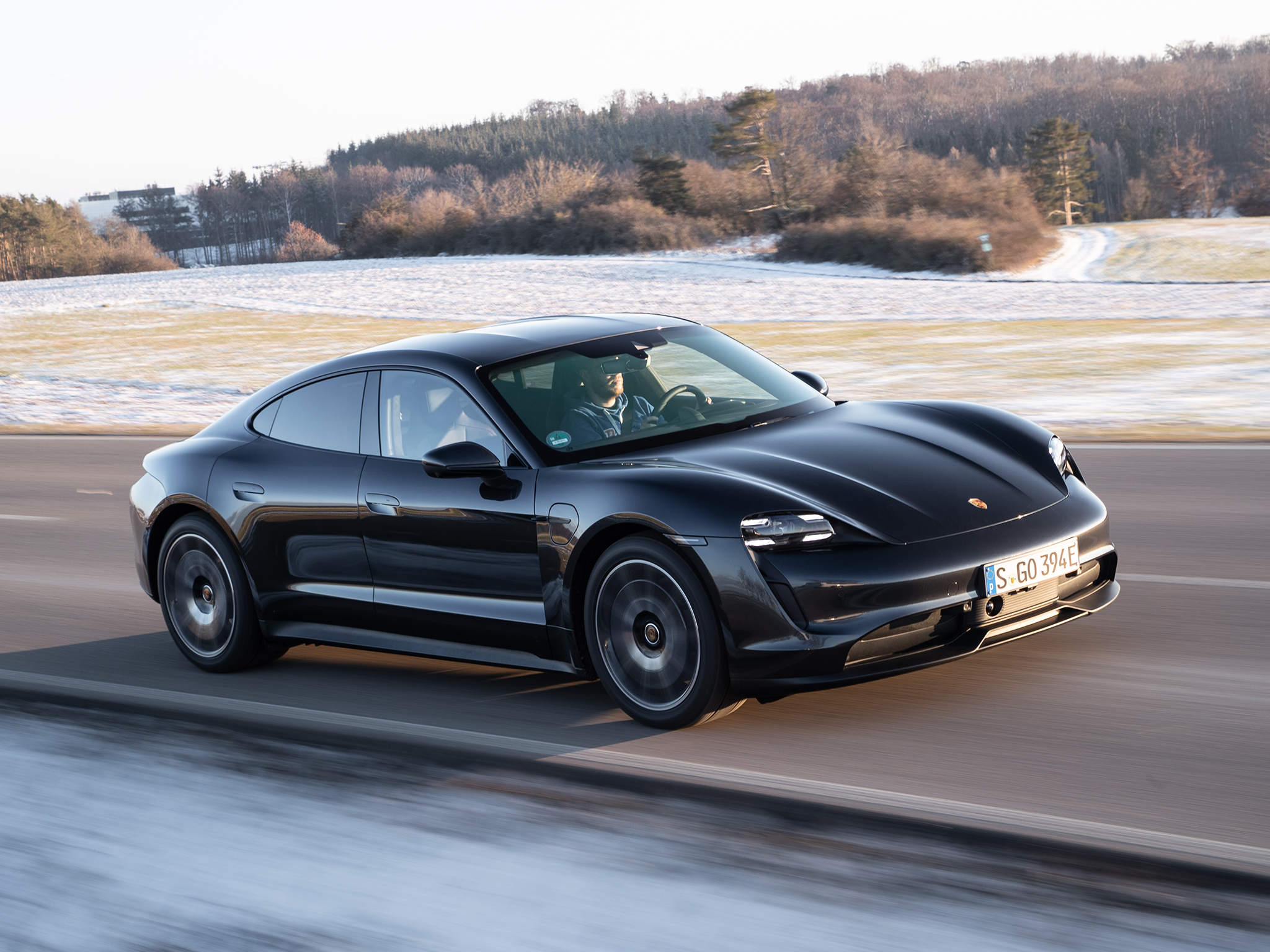
- Pros: Extremely fast charging, good range, outrageous performance in Turbo S guise
- Cons: Expensive optional extras, cramped back seats, depreciation
Porsche Taycan specs
- Price range: £86,500 to £186,300
- Battery size: 89 to 105 kWh
- Maximum claimed range: 394 miles
- Miles per kWh: Up to 3.72
- Maximum charging rate: 320 kW
Recently facelifted, the Porsche Taycan now has more power, more range and quicker charging than ever, and that all adds up to create a deeply impressive Tesla Model S alternative. The base car is priced from £86,500, and since it’s the least powerful yet can be equipped with the larger of two battery options, it has the most range – a massive 394 miles, Porsche claims.
The Taycan charges incredibly quickly too, with a maximum charge rate of 320 kW – that’s enough to see the battery fill from 10 to 80 per cent in just 18 minutes. And, being a Porsche, it’s just as quick off the line, with the flagship Turbo GT model hitting 62 mph in just 2.2 seconds. That’s a match for Tesla’s Model S Plaid.
Read our full Porsche Taycan review
We gave the latest Taycan a score of 9/10 and praised its extremely fast charging, great range and strong performance. Our expert said: “The recent facelift has done wonders to the Taycan’s spec sheet. It now has much more range than before and charges quicker than almost any other EV on the road today. Expensive, but a triumph of engineering.”
The best Tesla Model X alternatives
7. Kia EV9: From £65,025, Kia.com
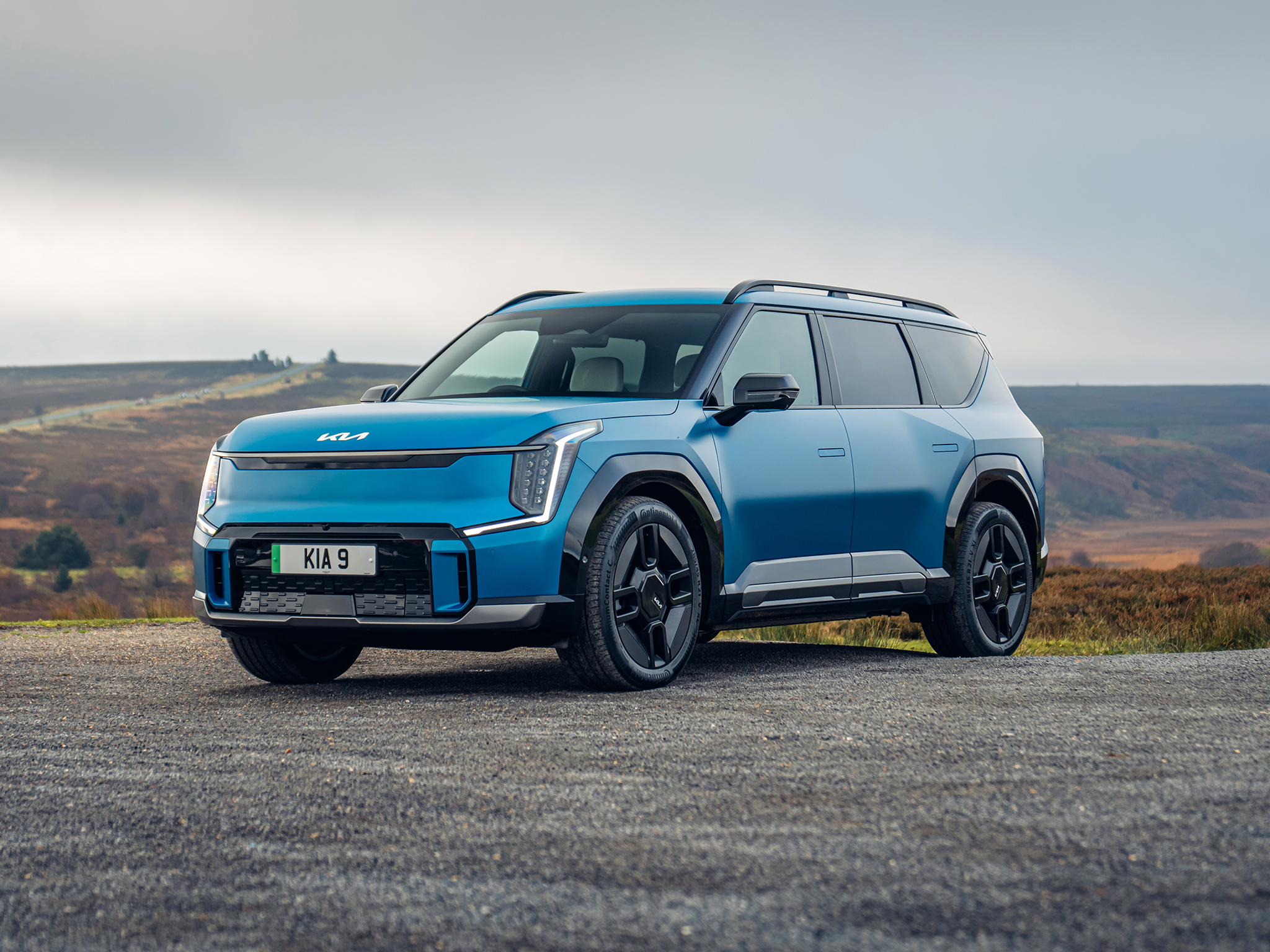
- Pros: Spacious interior, good range and fast charging, one of very few seven-seat EVs
- Cons: Feels very big when driving, heavy, interior materials could be better
Kia EV9 specs
- Price range: £65,025 to £77,025
- Battery size: 99.8 kWh
- Maximum claimed range: 349 miles
- Miles per kWh: 3.1
- Maximum charging rate: 210 kW
It’s big and it’s boxy, but we rather like the big family-mover that is the Kia EV9 – and it makes a pretty great alternative to the Tesla Model X which, like the Model S, is currently only available second-hand in the UK.
The big Kia can carry seven adults with ease, and it serves up the sort of comfort you’d expect from pricier petrol-powered rivals. Prices start at a fairly respectable £65,025 and head up to £77,025. All versions have a 99.8 kWh battery, maximum range is a claimed 349 miles, and the EV9 has a speedy charge rate of 210 kW – meaning 154 miles of range can be added in as little as 15 minutes.
We gave the Kia EV9 a score of 7/10 and praised its spacious interior, good range and fast charging – plus the fact it’s one of very few seven-seat EVs currently available. Our expert said: “I love how the EV9 looks, especially in blue, and while the interior has plenty of space for seven plus luggage, you’re always very aware of those massive dimensions while driving.”
8. Polestar 3: From £69,900, Polestar.com
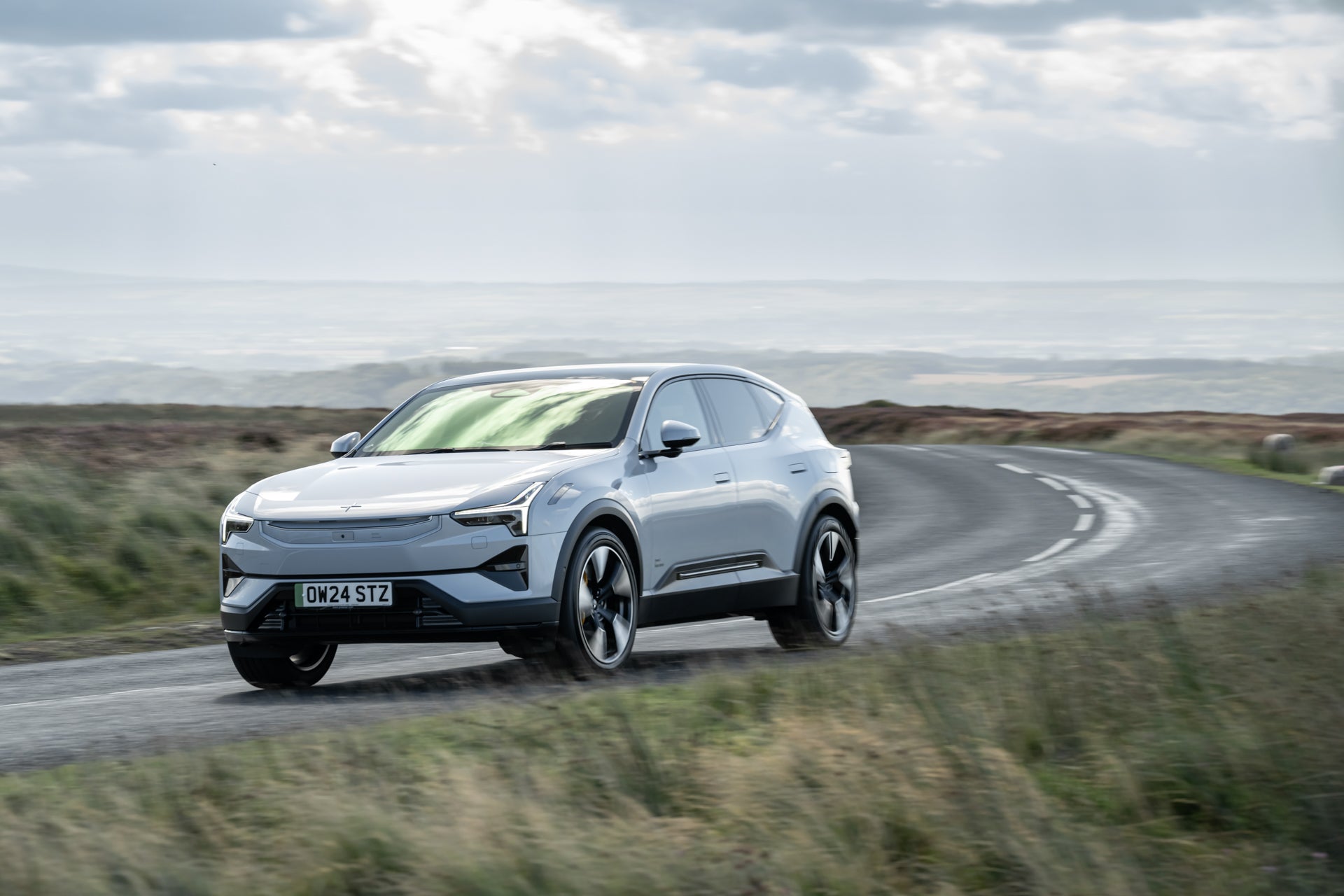
- Pros: Fun to drive, rides well, spacious interior, lots of kit fitted as standard
- Cons: Lack of physical controls can be annoying, no seven-seat option
Polestar 3 specs
- Price range: £69,900 to £81,900
- Battery size: 111 kWh
- Maximum claimed range: 403 miles
- Miles per kWh: 3.3
- Maximum charging rate: 250 kW
Polestar’s largest car yet, the 3 is a full-size SUV that boasts handsome Scandi design and excellent interior tech provided by Google. Being Volvo’s sporty relative, Polestar has created a car in the 3 that drives very well and should appeal as much to enthusiastic drivers as those who value a clean, modern and simple design aesthetic. Throw in fast charging and a range of up to 403 miles, and the Polestar 3 poses serious competition to the Tesla Model X – however, the Swede is strictly a five-seater, with no seven-seat option available.
Read our full Polestar 3 review
Our expert said: “I’ve had a soft spot for Polestar ever since the Swedish startup arrived in 2020. Its largest car yet upholds the brand’s reputation for smart design, a minimal interior with clever tech and driving enjoyment.”
The best Tesla Roadster alternatives
9. Hyundai Ioniq 5 N: From £65,000, Hyundai.com
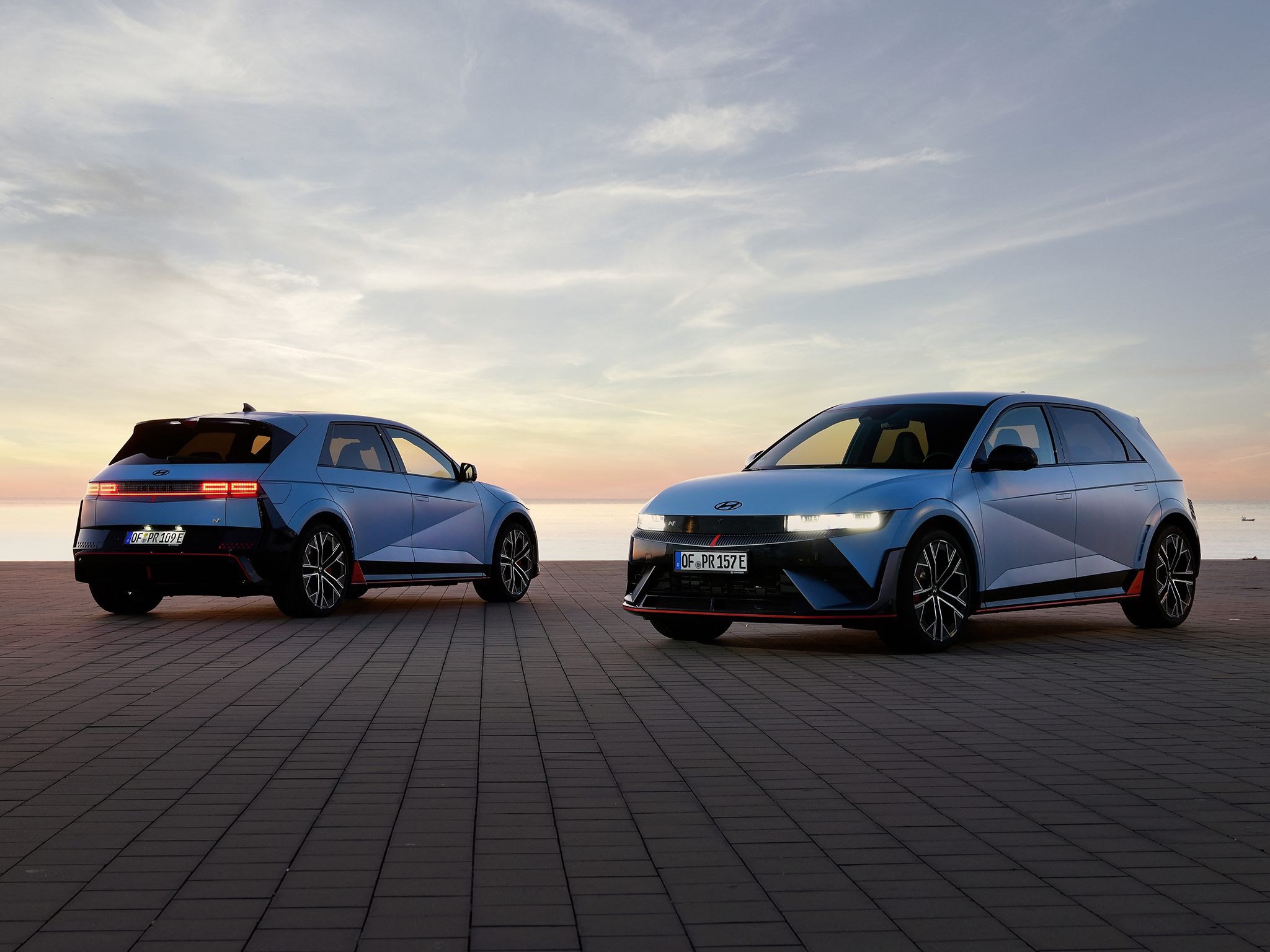
- Pros: Huge performance, simulated gearbox is surprisingly good, spacious interior
- Cons: Bigger than it looks, heavy, tech can feel overwhelming
Hyundai Ioniq 5 N specs
- Price range: £65,000
- Battery size: 84 kWh
- Maximum claimed range: 278 miles
- Miles per kWh: 2.93
- Maximum charging rate: 240 kW
Although not a convertible like the delayed, second-generation Tesla Roadster promises to be, the Hyundai Ioniq 5 N is a seriously sporty EV with huge amount of power and sharp handling, despite its bulk. More interesting than the spec sheet, however, is how this car uniquely has a drive mode that simulates an engine with an eight-speed, semi-automatic gearbox. That might sound like a gimmick, but it works shockingly well and is almost entirely convincing; the car accelerates through the ‘gears’ and even sounds like a petrol-powered sports car, at least to its occupants, since the engine, exhaust and turbo noises are fired through the sound system. The 5 N offers a level of driver engagement that no other electric car can match.
Read our full Hyundai Ioniq 5 N review
Our expert said: “Believe the hype. An EV that pretends to have an engine might sound daft, but Hyundai’s engineers have performed miracles with the 5 N. For a family-sized EV, it’s astonishingly good fun.”
10. MG Cyberster: From £54,995, Mgcyberster.co.uk
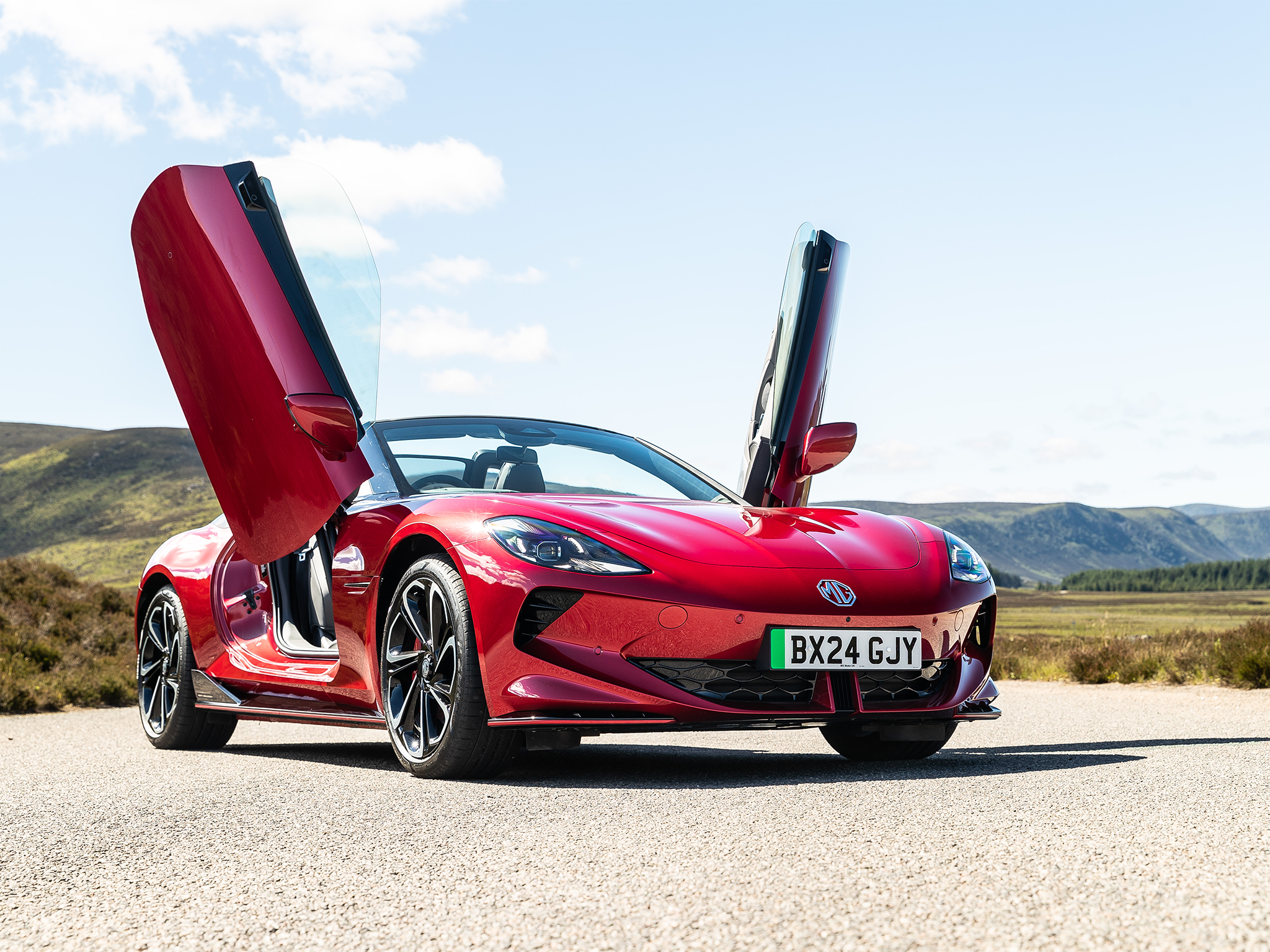
- Pros: Muscular styling, theatrical scissor doors, blistering straight-line pace
- Cons: Feels heavy, surprisingly high driving position, it pings and beeps at you really loudly
MG Cyberster specs
- Price range: £54,995 to £59,995
- Battery size: 77kWh
- Maximum claimed range: 276 miles (340 City)
- Miles per kWh: 3.7
- Maximum charging rate: 150kW
Who’d have thought that the first mass-produced convertible electric sports car would be an MG? Yet that’s exactly what happened with the Cyberster, which spearheads a reborn and resurgent MG keen to offers exotic cars as well as sensible daily drivers. We like the Cyberster’s muscular styling, its upwards-opening doors and huge straight-line performance. And, while it isn’t quite as quick as the next Tesla Roadster is claimed to be, there’s one major difference: the MG is available to buy right now.
Read our full MG Cyberster review
Our expert said: “MG was a company steeped in sporting history, but designs became more practical and sensible under Chinese Ownership. Enter the Cyberster with its commanding road presence, decent EV range and competitive pricing. History brought bang up to date - let’s hope this is a sign of things to come from MG.”
The verdict: Best alternatives to a Tesla
Once a byword for electric cars, Tesla now faces serious competition from legacy car makers. The industry might have taken a while to catch up, but today there are countless excellent alternatives that beat Tesla’s cars in range, efficiency, fast charging, price and comfort. Whether it’s a sleek and tech-forward car from newbies BYD and Polestar, or a spacious and sensible Volkswagen ID.7, there’s never been a better time to consider your options.
Join our commenting forum
Join thought-provoking conversations, follow other Independent readers and see their replies
Comments







Bookmark popover
Removed from bookmarks